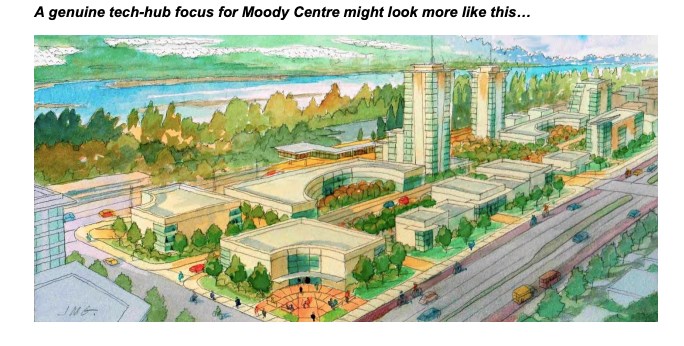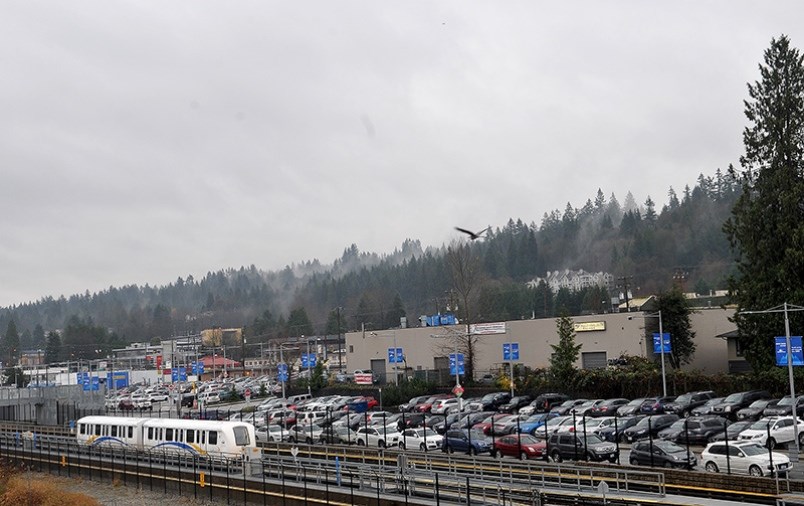Port Moody council will debate tonight a proposal to slow development in Moody Centre so staff can create a plan for job creation.
Coun. Hunter Madsen, the acting mayor, has produced a 20-page report calling for a change in vision for redevelopment of the area around the Moody Centre SkyTrain Station to attract employers with high-tech jobs.
Madsen said declining job numbers in the city are behind the urgency of bringing forward a new vision for the Moody Centre transit-oriented development area, located on the north side of St. Johns Street between Moody Street and Electronic Avenue.
Madsen said landowners in the area are developing a master plan for the corridor and he wants to get more clarity on the vision for jobs, including specific targets, a marketing plan to attract tech employers and, possibly, tax incentives to help transform Port Moody from a bedroom community to one that supports local business.
“Nine of 10 residents are leaving town for work, which is one of the worst rates in the Lower Mainland, it’s substantially worse than other jurisdictions,” Madsen told the Tri-City News.
“I believe this is the start of the conversation, it’s just we weren’t talking about jobs in Port Moody,” said Madsen, who is chair of PoMo's economic development committee.
But his proposal could get a rough ride tonight as some councillors are not taking kindly to Madsen’s suggestion that jobs have not been a priority.
MORE JOBS ALREADY VISIONED

Both Coun. Meghan Lahti and Coun. Diana Dilworth said job creation has long been a focus for redevelopment in the area, with the recently approved transit-oriented development plan calling for a university technology centre or other tech incubator hub for the area.
“This is something that we’ve been looking at doing,” said Dilworth. "So is everybody else.
"Hunter’s right, you need to have a focused vision," she said. "We can have it both ways, it’s not all or nothing. Because it’s private property, we need to work with the landowners, we need to be more collaborative and conciliatory and less sort of strident."
As recently as two years ago, PoMo approved a transit-oriented development plan for the area that included providing job space as well as a pedestrian overpass, and promoting affordable housing, Lahti said, adding that the official community plan has a similar vision.
Recently, council agreed to focus more on job creation in its strategic plan, but with his recent proposal, Madsen wants to “jump the gun,” Lahti said.
It’s “disappointing,” she said, “I think we all want to see this type of business in that area, just how do you go about doing that? The report is so full of hyperbole and negative comments, it takes away form the overall goal.”
One concern is the new “vision” being proposed by Madsen tonight, which would include allocating staff time to do the work, is pre-empting a report to come from a consortium of landowners in the area who are working on a master plan.
Council was to discuss the plan two weeks ago but that discussion was postponed, so voting on a new direction without talking to the landowners would be inappropriate, the Lahti and Dilworth say.
“We don’t want a situation where they are frustrated that we are pulling the rug under them and have them walk way,” said Lahti, speaking of a consortium that includes TransLink, the city, PCI Group and The Beedie Group among others.
MORE JOB TARGETS NEEDED
The city of PoMo and the Kwikwetlem First Nation also own property in the area, and some of the landowners are expected to turn out to tonight’s meeting.
“Council two weeks ago was to look at the vision and the concept. Mr. Madsen postponed that meeting. I believe he did that with the full intent to preempt that with his own notion of of what has to happen down there,” Dilworth said.
But Madsen says more efforts need to go into creating developments that will attract employers with high-paying jobs.
“What the city’s plan did not envision — nor introduce any concrete ideas for enabling — was the creation of a business/industrial/educational campus in Moody Centre,” Madsen’s report states.
He said he has already worked with the city’s new economic development manager on a short brochure to help businesses picture this business hub, and told the Tri-City News PoMo has a lot of amenities that would attract tech businesses, including SkyTrain stations, a fibre-optic network, parks, schools and an attractive place for people to live and work.
“This should not be a very controversial thing to bring to the fore now, I’m simply suggesting to the council that we make clearer language around specific types of jobs we want and numbers of jobs we want," he said.
Cities throughout MetroVancouver area trying to attract similar high-tech businesses but Madsen said PoMo is in a better place than most because it can effectively start from scratch with re-developing the area next to the Moody Centre station and can therefore build what such firms want.
And while some may suggest this is just another way for Madsen to reduce density in the area — which currently allows buildings of up to 26 storeys — Madsen disagreed, suggesting that residential density is still needed to support employment in the area.
“If you’re going to have an economic hub, you need spaces where people want to live close to it. It’s more of a matter of rebalancing the conversation for that part of the city so they have more focus, not just on jobs but good quality jobs.”



